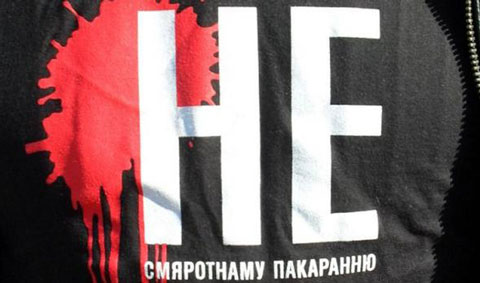Round table on death penalty held in Homel
On September 5, a round table "Because we are human beings: theory and practice in the discussions on the topic of the value of human life" was held in Homel.It was attended by human rights activists, lecturers of universities and representatives of the Interfaith Mission "Christian Social Service".
The purpose of the event was to convey to the society the Christian view of the death penalty. Interfaith Mission prepared a special collection of sermons of priests of different denominations, which refer to the holiness and sanctity of life. The event's participants agreed that it is important that the spiritual leaders of traditional religions should address believers with a defined position on the death penalty.
Human rights defender Leanid Sudalenka presented arguments for the unequivocal abolishment of the death penalty. Mr. Sudalenka rendered legal aid to a resident of Homel Aliaksandr Hrunou, sentenced to death fora brutal murder of a 23-year resident of Homel Natallia Yemialyanchykava.
We should remind that he was convicted twice. The initial verdict of the Homel Regional Court was quashed by the Supreme Court, which sent the case back for retrial. However, as a result of the second trial Mr. Hrunou was sentenced to death again. The verdict hasn't been executed yet.
The main topic of discussion in Homel was a Christian perspective on the problem of the death penalty. Human rights activist Viktar Adzinochanka from BHC noted that about 80% of the population of Belarus consider themselves believers. However, roughly the same percentage supports the death penalty. Therefore, the human rights activist came to the conclusion that religion for these people is just declarative, and emphasized that the presence or absence of the death penalty has no effect on the crime rate.
The positions and arguments of supporters and opponents of the death penalty were voiced at the event, as well as the attitude to alternative punishments among citizens of Belarus.
In 2013, on the order of "Penal Reform International," the Department of Sociological and Marketing Research of the group of companies "SATIO" (Minsk) conducted a comprehensive sociological study on the territory of the Republic of Belarus, which focused on the attitude of citizens to different types of punishment, including the use of the death penalty and its alternatives. The main feature of the results of research was the discovery of a wide range of opinions and positions in relation to the death penalty. These results allow us to take a fresh look at the subject of discussion – whether the death penalty should be canceled or not.
Being asked a direct question about the abolition of the death penalty, more than half of respondents in Belarus (63.8%) spoke in support of its application. At the same time, just 36.5% certainly support the death penalty, whereas 31% fully support its abolition. About one third of the respondents support one of the sides, but with significant reservations. The results showed that most of these conditions is associated with limitations on the death penalty: 12.4% considered moratorium on the death penalty to be the most adequate means, 14.5% - agree with the abolition of the death penalty in the future, 16.6% - believe that the death penalty needs to be abolished immediately.
On the other hand: 36.2% believe that the death penalty should be left as it is, and 10% say its use shall be expanded.
The poll shows a low public awareness in regard to the very subject of the death penalty in the country, which was the most unexpected thing in the evaluation of the research results. It was found that about 32.8% of citizens had incorrect information about the real situation concerning the use of the death penalty in the country. Of these, 9.7% of respondents believe that the death penalty has been abolished, 7.1% - that the death penalty has not been applied for many years, 5.5% - that there is a moratorium, and 10.5% were unable to give any answer. On the one hand, it shows little interest in this subject, on the other hand – the low level of accurate thematic information, obtained by Belarusians.
The position of the inhabitants of Belarus varies greatly depending on the age and religious beliefs of the respondents. Thus, one can observe a proportional increase in the number of supports of the death penalty with increasing age of the respondents: 30% of young people (18 to 30 years) to 42.3% of people of retirement age (61 years and older).
As a result of the study, detailed information about the arguments of people who support one of the sides in the issue of the death penalty. The main argument of 36.5% of strong supporters of the death penalty is "adequate punishment for the crime committed". An additional argument in support of the death penalty is the feeling of security.
31.0% of respondents - staunch opponents of capital punishment –explain their position with the value of human life. 48% believe that the state "may not take a human life", and 47.3% prove their position with the risk of a miscarriage of justice.
A significant part of the population - 73.5% versus 9.7% - fear of miscarriages of justice and believe that it is worse to condemn an innocent man than to let the guilty go unpunished. Active supporters of the death penalty say that miscarriage of justice is impossible, saying that “we need to trust the judges” and their competence (in fact, defending the position that it is necessary to trust the judicial system by definition).
The highest percentage of those who recognize the priority of the presumption of innocence - 86.7% - was among the residents of the Belarusian villages.


